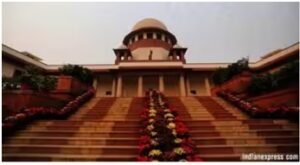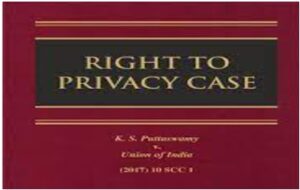A privacy report card
In six years since verdict, SC has expanded freedoms. It should continue to do so
Relevance
- GS Paper 2Government policies and interventions for development in various sectors and issues arising out of their design and implementation.
- Tags: #privacy #puttaswamycase #SC #fundamentalrights #democracy #upsc.
Why in the News?
6 years completed of landmark Puttaswamy judgement.
Introduction
After more than six years of deliberations and revisions, India’s data protection law, known as the Digital Personal Data Protection Act, was passed by both houses of Parliament last month. This milestone comes precisely six years after the landmark KS Puttaswamy vs Union of India judgment by the Supreme Court, which reasserted the right to privacy and emphasized the need for a dedicated data protection law.
The Foundation: Puttaswamy Judgment
- The Puttaswamy judgment laid the foundation for privacy jurisprudence in India, affirming the right to privacy as an integral component of fundamental rights under the Indian Constitution.
- The Court, in six separate opinions, provided an expansive interpretation of the right to privacy, conceiving it not merely as protection against physical intrusion but as a right encompassing the body and mind, enabling free decision-making, and closely tied to human dignity and autonomy.
Evolution of the Right to Privacy
- Six years on, we examine how the Supreme Court has developed the right to privacy. The Court has explored principles of autonomy, dignity, and identity in relation to privacy, bolstering the framework of constitutional rights. Notably, it decriminalized consensual adult sexual relations, regardless of gender or orientation.
Challenges Ahead
- In the coming years, the Supreme Court will face crucial decisions that will shape the evolution of fundamental rights and freedoms.
- This includes the case regarding the alleged use of Pegasus spyware on Indian citizens and the judgment on the right to marry for LGBTQIA+ individuals.
- It has also reviewed its verdict in the Sabarimala case, which pertains to women’s entry into the Sabarimala shrine.
Impact Beyond the Supreme Court
- The effects of the Puttaswamy judgment have extended beyond the Supreme Court, influencing high courts across India.
- These courts have provided nuanced interpretations of the right to privacy, especially in cases involving the right to be forgotten and the removal of personal information from public records.
Challenges to the Data Protection Act
- Certain contentious provisions of the Digital Personal Data Protection Act are expected to face legal challenges, and the Court will be tasked with interpreting and upholding the law.
- Privacy considerations have also been used to combat the sharing of intimate images without consent.
High Courts and Privacy
- High courts have relied on Puttaswamy to clarify the limits on the powers of investigative authorities regarding surveillance, search and seizure, and DNA testing.
Conclusion
While the right to privacy has seen significant advancements, it has not always prevailed, and limitations have been imposed. Nevertheless, the Supreme Court’s continued commitment to expanding the scope of privacy rights is crucial for individuals to exercise their rights and freedoms effectively in India.
| Defining the Right to Privacy
The Right to Privacy can be characterized as the capacity of an individual to maintain solitude and exercise discretion in their expressions without surveillance or disruption. · In simpler terms, it encompasses an individual’s entitlement to seclusion, shielding them from public scrutiny and intrusion. · In contemporary contexts, it frequently pertains to information privacy, signifying “the entitlement to exert some influence over the collection and utilization of personal information.” · In essence, the Right to Privacy establishes a legal framework that bestows individuals with the legal authority to safeguard their personal data and privacy under Article 21. |
| Key Points from Puttaswamy Case Judgment
1. Scope of Privacy Concerns: The judgment acknowledged that privacy concerns can arise from both state and non-state entities in the modern technological age. 2. Limitations on Informational Privacy: It clarified that informational privacy in the internet era is not an absolute right. The exercise of control over one’s data might lead to some degree of privacy violation. 3. Expanding Ambit of Article 21: The judgment emphasized that Article 21, which guarantees the right to life and personal liberty, has seen continuous expansion over the years. Numerous rights have been included within its scope. 4. Fundamental Right to Privacy: The 9-judge bench pronounced the judgment on 24th August 2017, affirming that the Right to Privacy is a fundamental right inherent in Part III of the Constitution, which safeguards fundamental rights. 5. Balancing Rights: The judgment recognized the conflict between an individual’s right to privacy and the government’s legitimate policy implementation. It stressed the need to strike a balance between these interests. 6. Triple Test for Privacy Incursion: The court established that any intrusion on privacy by state or non-state actors must pass a triple test, including a legitimate aim, proportionality, and legality. 7. Overruling Past Decisions: The judgment overruled the decisions in M.P. Sharma v Satish Chandra, which denied constitutional protection to the Right to Privacy, and Kharak Singh, which held that the Right to Privacy is not guaranteed by Part III of the Constitution. 8. Intrinsic Part of Fundamental Rights: It reaffirmed that an individual’s right to privacy is not only protected by Article 21 but is also an integral part of the broader framework of Part III, which safeguards fundamental rights. |
| Digital Personal Data Protection Bill, 2023
Bill is based on the following seven principles: · The principle of consented, lawful and transparent use of personal data; · The principle of purpose limitation (use of personal data only for the purpose specified at the time of obtaining consent of the Data Principal); · The principle of data minimisation (collection of only as much personal data as is necessary to serve the specified purpose); · The principle of data accuracy (ensuring data is correct and updated); · The principle of storage limitation (storing data only till it is needed for the specified purpose); · The principle of reasonable security safeguards. · The principle of accountability (through adjudication of data breaches and breaches of the provisions of the Bill and imposition of penalties for the breaches). The Bill protects digital personal data (that is, the data by which a person may be identified) by providing for the following: · The obligations of Data Fiduciaries (that is, persons, companies and government entities who process data) for data processing (that is, collection, storage or any other operation on personal data); · The rights and duties of Data Principals (that is, the person to whom the data relates);and · Financial penalties for breach of rights, duties and obligations. |
Sources: PIB, Indian Express
Mains Question:
Discuss the evolution of the right to privacy in India, with a focus on its foundations in the KS Puttaswamy vs Union of India judgment. Analyze the Supreme Court’s interpretation of privacy as a fundamental right and its impact on constitutional principles. 250words.






